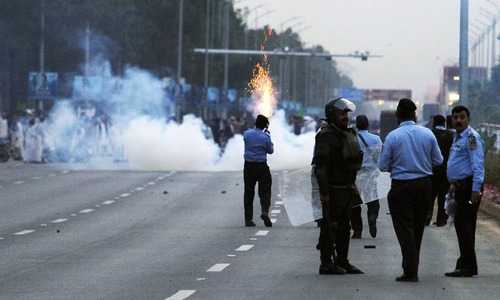Multi-tasking Interior Minister Chaudhry Nisar Ali Khan has a new assignment from Prime Minister Nawaz Sharif and he is furious. Not because dismantling D-Chowk posed much of a challenge for him, but because it came after his efforts were botched by the party’s administration in Punjab.
His pain relates to the huge embarrassment followers of Mumtaz Qadri caused the government by storming the high security Red Zone and staging a sit-in at D-Chowk on March 27. The minister openly spoke about his frustration at the unchallenged entry of radical hordes from Rawalpindi into Islamabad in his press talks in the wake of the mayhem.
What he stressed most was that the ugly events took place despite the intelligence reports his ministry had communicated to the Punjab government regarding Qadri’s chehlum. Therefore, it was the responsibility of the Punjab government in the first place to manage the crowd and not let them move towards Islamabad.
See: Red Zone sit-in by pro-Qadri demonstrators ends after successful negotiations
But he was equally disturbed by what he called the total failure of law enforcement agencies and the civil administration of the Islamabad Capital Territory (ICT) to check the Qadri marchers at Faizabad.
That line of argument, however, raises an important question: who was in a decision-making position on March 27, both at Liaquat Bagh and then on the Islamabad side, at Faizabad?
Officials holding senior positions in the Islamabad police and civil administration offered some interesting pieces of information in response. Both cadres recalled their experience handling the PTI and Pakistan Awami Tehreek (PAT) dharna that was staged in the same Red Zone for five months of 2014, to explain the lack of action against Qadri’s followers.
“That day (March 27), we kept waiting for direct orders from the Ministry of Interior. We had no prior information that the crowd might move from Liaquat Bagh towards D-Chowk,” an official of the ICT administration told Dawn.
When reminded of the ubiquitous Standard Operating Procedures (SOPs) that are in place for just such an eventuality, the official said, “Yes, SOPs exist to be invoked in a given situation. But for a government like the present one, officers prefer direct instructions from the top because even a little misstep may get you thrown out.”
If the Islamabad police and ICT admin had decided to use force to deny entry to protesters, and the confrontation had resulted in some causalities on either side, he argued, the government could have “conveniently put the entire blame” on local officials.
Another ICT officer rued that “frequent interference of political bosses in the official routine has become a serious issue” and was “taking its toll on officers’ output.” He found the interior minister’s criticism of the administrative machinery regarding the latest sit-in “a bit unfair”.
“When you take a decision, you stand by it. That’s what officers need from the political bosses,” said the official, referring to Chaudhry Nisar’s decision banning all sorts of gatherings at the D-Chowk. This resolve may soon be tested, as the PTI is planning to observe its 20th foundation day on April 24 at D-Chowk.
A mid-ranking police officer noted the “ill treatment” the former inspector general of police (IGP) Aftab Ahmad Cheema and senior superintendent of police (SSP) Mohammad Ali Nekokara received at the hands of Interior Minister Chaudhry Nisar Ali Khan for their independent thinking. They refused to follow the minister’s orders and are fighting legal battles to retain their jobs.
“Chaudhry Nisar’s disciplinary actions against the two senior-most police officers have their successors thinking twice before acting on their own,” said the officer. “Why would a police officer take an initiative and risk his job?”
Ex-IGP Cheema was found to be in the wrong because he didn’t like the minister interfering with the police command during the dharna, whereas former SSP Nekokara had opposed the use of force against PAT and PTI protesters.
While Nekokara is contesting his removal from service in a court of law, Cheema has been trying to get the charge of disobedience removed from his service record before his retirement, due in the near future.
Published in Dawn, April 8th, 2016














































